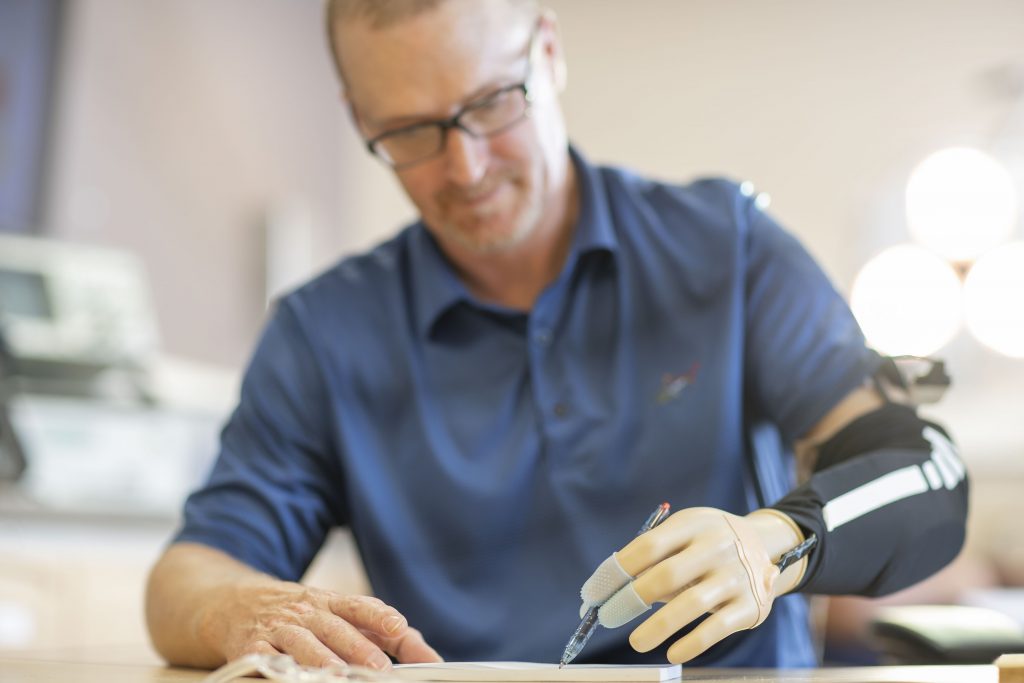Evaluating the Impact of Prosthetic Device Features on the Experience of Prosthesis Use
The goal of the study is to understand what features are most important to upper limb prosthesis users. We hope that the information gathered in the study can help guide prosthetics companies in designing or improving prosthetic devices to better suit what users need. We’d like to ask individuals about their preferences and experiences with their upper limb prostheses. We’re interested in the ways in which individuals use their prosthesis, their attitudes and perceptions of their prosthesis, and some of the positive and negative aspects of their prosthesis experience.
To do this, we are conducting telephone interviews to discuss these experiences. We are asking individuals to participate in a total of 2 interviews, each one hour in duration. We’re looking for a certain number of individuals who use different types of prosthetic devices. The types of prostheses of interest to the study include body- powered prostheses, myoelectric prostheses consisting of one or more degrees of freedom, as well as prostheses that provide sensory feedback. In addition we are looking for individuals who have participated in research trials of either advanced prostheses, advanced prosthetic control, or sensory augmentation. Eligible individuals may be asked to complete surveys instead of the interviews, or in addition to the interviews. The surveys will be administered over the telephone or online, and will take about an hour to complete. The surveys, like the interview, will also focus on the individual’s experiences with upper limb prostheses.

About This Study
Objective/Specific Aims: The goal is to understand the critical factors associated with outcome acceptance following upper limb loss and to understand the psychosocial experience of upper limb prosthesis use. We must understand the relationships between prosthesis functional and sensory capabilities, the subjective experience of the prosthesis, and outcome acceptance following limb loss, in order to provide better prosthetic device options and improve rehabilitation outcomes. Study results will enable clinicians and researchers to evaluate and predict patient outcomes following limb loss based on user priorities and to design interventions that improve outcomes.
- Aim 1: Assess the impact of the experience of prosthesis dexterity and control on outcome acceptance.
- Aim 2: Assess the impact of sensory feedback experience on outcome acceptance.
- Aim 3: Refine the theoretical model derived from qualitative analyses by exploring the quantitative relationships between aspects of the model of outcome acceptance.
- Aim 4: Examine how access to care and experiences with care shape acceptance of prosthetic devices
- Aim 5: Examine how perceived societal views affect prosthesis choice and acceptance
- Aim 6: Examine how patient-specific needs interact with expectations about device benefits and limitations to impact prosthesis acceptance
- Aim 7: Utilize clinician input and findings from qualitative analyses to design a prototype decision tool (TOP-MATCH) to facilitate matching patients with upper limb prostheses
What will happen if I participate in this study?
If you agree to participate, a researcher will ask you to schedule one or two one-hour telephone calls. During the telephone call, you will be asked a series of questions about your prosthesis. The interview or survey will be audio-recorded, so that the researcher can document your answers. If there are questions that you do not feel comfortable answering, you may ask to skip them without any explanation needed.
This study involves either a telephone interview, or a
telephone survey.
Your answers to the questions, whether they be from the interview or survey, will be combined and analyzed along with other participants who use a similar prosthesis as you.
You can stop your participation at any time for any reasons without penalty or loss of VA or other benefits to which you are entitled.
Eligibility Criteria
- 18 years or older
- Ability to give verbal informed consent
- Ability to speak and understand English
- Unilateral acquired trans-radial or trans-humeral amputation
- At least six months from time of limb loss
- Current user of an upper limb prosthesis
- Use of a prosthesis for at least six months
Principal Investigators: Emily Graczyk, PhD
Program Contact: Melissa Schmitt
Contact Number: (216) 791-3800 x63801
Contact Email: amputeesurvey@fescenter.org
Contact Request
Researchers rely on individuals to serve as volunteers for program studies. Each study is designed to answer questions about a specific medical aspect or the effectiveness of a particular treatment. Through the commitment of research volunteers, knowledge gained and communicated to other medical professionals ultimately benefits the community.
If you would like more information about becoming a research volunteer please submit the information below.
